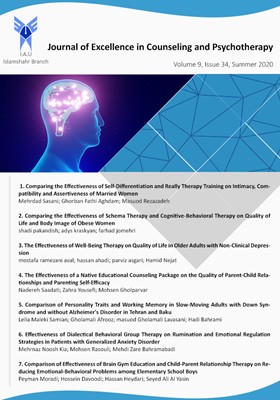The Effectiveness of a Native Educational Counseling Package on the Quality of Parent-Child Relationships and Parenting Self-Efficacy
Subject Areas : Journal of Excellence in Counseling and PsychotherapyNadereh Saadati 1 , Zahra Yousefi 2 * , Mohsen Gholparvar 3
1 - PhD Student in Counseling, Department of Counseling, Isfahan Branch (Khorasgan), Islamic Azad University, Isfahan, Iran
2 - Assistant Professor, Department of Psychology, Isfahan (Khorasgan) Branch, Islamic Azad University, Isfahan, Iran
3 - Associate Professor, Department of Psychology, Isfahan (Khorasgan) Branch, Islamic Azad University, Isfahan, Iran
Keywords: parent-child relationship, parenting self-efficacy, Native Education Counseling,
Abstract :
Purpose:The aim of this study was to determine the effectiveness of indigenous education package training on the quality of parent-child relationships and parenting self-efficacy of mothers with adolescent boys. Methodology: The research method was quasi-experimental, pre-test-post-test and two-month follow-up with experimental and control groups. The statistical population of the study was mothers with adolescent boys aged 12 to 18 years in Isfahan in 2019, of which 87 mothers with lower parent-child relationships and parenting self-efficacy through Pianta (1994) parent-child relationship questionnaire, Parental self-efficacy Dumka, Strezinger, Jackson, and Rosa (1996) were screened for self-efficacy. Finally, 40 mothers were selected and randomly assigned to the experimental group (20 mothers) and the control group (20 mothers). Participants in both groups completed parent-child relationship questionnaires and parental self-efficacy in three stages. The experimental group received a native 90-minute training package (researcher-made) for 8 sessions. Data were analyzed by repeated measures analysis of variance in SPSS software version 24. Findings: The results indicate the effect of the Indigenous Educational Counseling package on the score of the parent-child relationship (P = 0.003) with the effect size of 0.21, positive parenting self-efficacy (P = 0.024) with the effect size of 0.12, negative parenting self-efficacy (P = 0.033) with an effect size of 0.11 in the post-test stage and the stability of this effect was in the follow-up stage. Conclusions: The results of the study suggest evidence that training this program to prevent and improve the relationship of each parent with their adolescent sons reduces negative parenting self-efficacy and improves the parent-child relationship so that we see less conflict between parents and adolescent boys in society; This research can be useful for psychotherapists and counselors in the field of adolescent counseling and choosing the type of intervention to educate parents.
_||_

